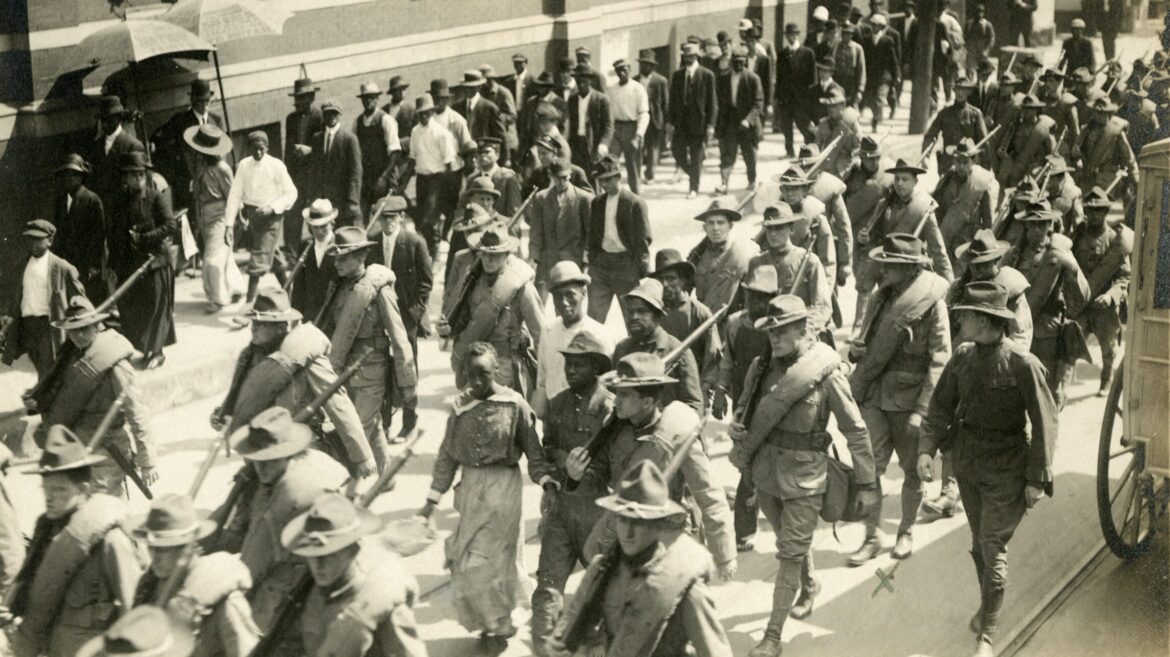Podcast about Georgia’s Forsyth County explores legacy of town’s racist history

DuBose Family Visual Arts Materials / Kenan Research Center at Atlanta History Center.
The Georgia National Guard escorts prisoners from Forsyth County, Ga., to the Atlanta train station on Oct. 2, 1912.
It’s hard to dispel a longtime rumor, but it’s important — especially when the truth is just as horrifying.
With 1912: The Forsyth County Expulsion and its Aftermath, a new podcast from WABE and the Atlanta History Center, the two local institutions collaborated to do just that.
The myth the show aims to dispel, long held by some Georgians, is that Georgia’s Lake Lanier sits atop a once-thriving Black community called Oscarville. Comedian Amber Ruffin perpetuated the story in a clip that went viral. The precipitating event goes back to 1912, when essentially the whole Black community was expelled after several young men were blindly accused, tried and hanged for allegedly commiting a rape and murder.
Some of this is true. There were two reported rapes in Forsyth County, Ga., in about the space of a week in September 1912. First, a white woman named Ellen Grice was discovered with a Black man in her bed in the middle of the night. She alleged that he’d raped her, and the police arrested five different Black men, unsure of who actually could have committed the crime. They were later released.
About a week later, a white woman named Mae Crow was found raped, beaten and left to die near Oscarville, Ga. Crow never regained consciousness. Police arrested a Black family of four: a woman and her husband, her brother and a cousin. The husband was lynched in jail and the woman was convinced to flip on her brother and cousin, both of whom were publicly executed. Almost overnight, angry white mobs and anonymous night riders drove every other Black resident out of Forsyth County.

There’s a lot wrong about that Lake Lanier story, though. For one, Oscarville — which had a mostly white population — wasn’t washed away or covered up by the man-made lake. The town is still on the map, but no one lives there. Secondly, the lake wasn’t created until the mid-1950s, decades after these incidents.
What actually happened in Forsyth County in 1912 is tragic enough that it shouldn’t have to be stuffed into some silly story about a lake, especially when the effects of the expulsion are still rippling through the descendants of the more than 1,000 people who were forced to leave their land, jobs, animals and homes, generally without any sort of compensation.
Research ‘mission-aligned’ with WABE
1912 tells the story of what happened through the voices of the descendants, many of whom are only just now sharing their families’ stories. Born out of research by co-narrator Sophia Dodd, a digital storytelling specialist for the Atlanta History Center website, the six-episode podcast took over two years to research, write and record, with the AHC funding the entire process. WABE’s Rose Scott, who hosts the midday news program Closer Look, was brought on to act as Dodd’s co-narrator this year. WABE came on board shortly thereafter to distribute the podcast.
The partnership happened organically, says Scotty Crowe, VP of audio at WABE. The station and the center have collaborated before on special projects, such as Rose’s annual Juneteenth program, which was recorded in AHC’s auditorium. “There’s a shared relationship. … The fact that Rose was a narrator on the show made it a natural fit for us, in addition to the show being so mission-aligned with what we do at our station.”
Since its mid-November launch, 1912 has become one of WABE’s most successful podcasts ever in terms of reach and listenership by cracking Apple Podcasts’ History and Documentary charts. “The numbers for 1912 have consistently put its episodes in the top two or three percent across all podcasts,” Crowe says. Despite being essentially an Atlanta-area story, the show has drawn listeners from all over the country.
WABE plans to promote the podcast again in February during Black History Month, believing that the story has legs beyond its initial release. The station is also talking with the Center about potentially re-cutting podcast episodes so the show could be distributed nationally for public radio broadcasts.
‘We’d done our due diligence’
Scott was well aware of the history of Forsyth County before she signed on to the project, she says. A visit with Dodd and AHC’s VP of Digital Storytelling and 1912 EP Kristian Weatherspoon really sealed the deal. “They took me down to this archival vault and Sophia pulled out all these boxes of census and death records. …It was just like, ‘Wow, tell me what you need me to do,’” Scott says. Dodd and Weatherspoon had already done much of the writing and research. Scott says she helped shape the podcast’s story.
Dodd went through the U.S. Census records from the time of the expulsion to track about 700 residents who had fled Oscarville. She dove into records of the counties where they relocated, developed relationships with local Black churches, and contacted the Forsyth Descendent Scholarship program, working to build trust with the communities. The history center also enlisted a Black genealogist to make sure that researchers were contacting and connecting with the right families. “We had to be sure that we were doing this correctly, with the right level of sensitivity, because it is a traumatic experience for these families,” Weatherspoon says. Ultimately, the podcast team interviewed about 20 descendants, plus other local residents, authors, historians and community organizers.
The team did occasionally run into families who weren’t aware of what had happened to their ancestors. Some believed the myths about the region’s history, which the 1912 team was quick to dispel with subjects, albeit with a gentle hand. “That was really important for us to do at the outset, because that led to people trusting us,” Weatherspoon says. “They saw that we’d done our due diligence. We knew all of the facts. None of it was made up or hyperbole. It was done with bedrock research, which is part of what makes our podcast special. No one’s heard or seen this specific research before, and it really is the core of our story.”
Talking to descendents of the exiles was important because it helped the show’s creators demonstrate what a multigenerational event the expulsion was.
One family ended up fleeing to Atlanta, where they were able to reestablish their businesses and start to thrive. But eventually, their new property was seized. This time it was turned into a public park for the benefit of the city’s white residents.
Deciding what’s next
The history center and WABE hosted a launch event last month with show guests and Forsyth County descendants. Since the podcast dropped, Scott has heard from even more people who think they’re connected to those forced out of Forsyth.
“I actually called Kris [Weatherspoon] and said, ‘We need to do something else,’” Scott says. “Maybe it’s an event at the history center that helps people track down if they had relatives in Forsyth. Maybe it’s a census how-to, like how to start on your genealogy.”
“I think that’s so important, particularly for a lot of people of color in this nation who are looking to find out who their roots are from,” Scott adds.
Weatherspoon and Dodd have also been talking about how to make the research more accessible to interested parties. That could allow them to search for family names or long-lost (or loved) relatives, Witherspoon says.
“We would love to keep up with the descendants,” Dodd adds. “They want to keep meeting and we hope that they do — and that they feel comfortable including us in that because we want to see what they do in the future.”
Crowe hopes to find more opportunities for WABE to collaborate with the history center. “I’d love to do more stories like this,” he says. “We know that there’s an audience for it, and the history center is constantly launching exhibitions and installations that look at these types of events. Perhaps there’s an extension of this style of story that we can do together, so that we can continue this model.”






